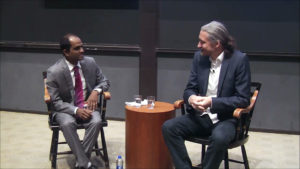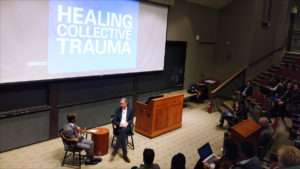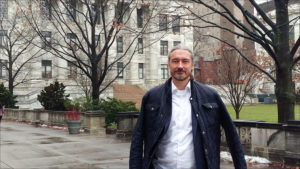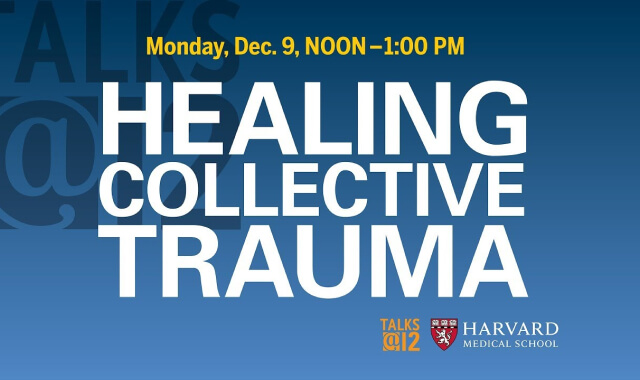Thomas Hübl gave talks at Harvard Medical School and Martinos Center for Biomedical Imaging, in Boston, Massachusetts, USA, in December 2019.
“One of the major elements of healing is relation. In healing relation, I create like a kind of relational warmth and generosity that allows people to really drop in and be partners in the conversation about their health. I think it’s a prerequisite if I work in a healthcare profession to have a certain level of ‘response-ability’ because when I’m reactive I’m not responding, I’m reacting.”
Discussing the importance of a support system for healthcare providers, Thomas shared his insights on how to bring the fragmented parts of ourselves and our systems into deeper integration. On this rainy day in early December, approximately 80 students, staff, and faculty came out to attend a talk at Harvard Medical School with Thomas and Dr. Bala Subramaniam, an associate professor of medicine and director of the Center for Anesthesia Research Excellence at Beth Israel Deaconess Medical Center in Boston.

For the past three years, Dr. Subramaniam has been studying the neuro-physiological effects of meditation when practiced by pre-op and post-op patients. He conducts social behavioral research on the role of meditation in supporting surgeons, anesthesiologists, and nurses, and has been offering meditation workshops to healthcare providers across the US and India. As Thomas and Dr. Subramaniam engaged together in dialogue, Dr. Subramaniam said, “I am impressed by your level of looking at collective trauma and (how you go into) organized societies and take care of their biggest problems, the big elephant that no one wants to touch like the German Jewish problem or another collective trauma. For example, the occupation in India – now people are just coming out of that occupation and slavery and trying to have a different mindset.”
 More than 5,000 people joined the talk from across the world via livestream, as comments and questions poured in from India, Germany, Mexico, and Hong Kong, among other countries. At the end of the first week, more than 20,000 people had viewed that talk. In responding to a question about his work with collective social bodies, Thomas said, “Individual (trauma) work is very important, and that needs to continue, but I think we need larger containers because we have so many collective scars around the world.” After the talk concluded, several people waited to speak with Thomas to discuss practices that promote healing of collective trauma.
More than 5,000 people joined the talk from across the world via livestream, as comments and questions poured in from India, Germany, Mexico, and Hong Kong, among other countries. At the end of the first week, more than 20,000 people had viewed that talk. In responding to a question about his work with collective social bodies, Thomas said, “Individual (trauma) work is very important, and that needs to continue, but I think we need larger containers because we have so many collective scars around the world.” After the talk concluded, several people waited to speak with Thomas to discuss practices that promote healing of collective trauma.
 Later in the day, Thomas spoke at the Martinos Center for Biomedical Imaging, a Harvard-affiliated imaging institute at Massachusetts General Hospital. Approximately 100 scientists and post docs filled the room to hear his talk “Understanding & Healing Trauma: Moving from Individual to Collective.” During this event, Thomas opened up a dialogue around the future of brain imaging. Will it be possible one day to map the experience of collective trauma in our brains? How can we utilize scanning technologies to elucidate relational capacities as they manifest in our neurobiology?
Later in the day, Thomas spoke at the Martinos Center for Biomedical Imaging, a Harvard-affiliated imaging institute at Massachusetts General Hospital. Approximately 100 scientists and post docs filled the room to hear his talk “Understanding & Healing Trauma: Moving from Individual to Collective.” During this event, Thomas opened up a dialogue around the future of brain imaging. Will it be possible one day to map the experience of collective trauma in our brains? How can we utilize scanning technologies to elucidate relational capacities as they manifest in our neurobiology?
These talks, normally presented by Harvard faculty, opened up new possibilities for discussing the impact of collective trauma on our healthcare systems. They also provided a much needed opening to further the conversation around preventing burnout among physicians, improving our medical education systems to include awareness-based practices, and offering trauma-informed care to patients and communities.
Here is the recording of the talk:
